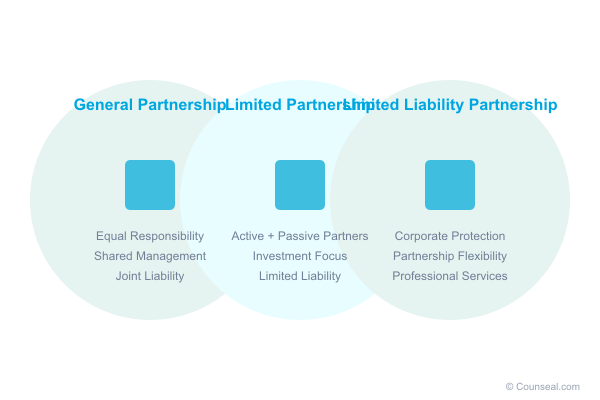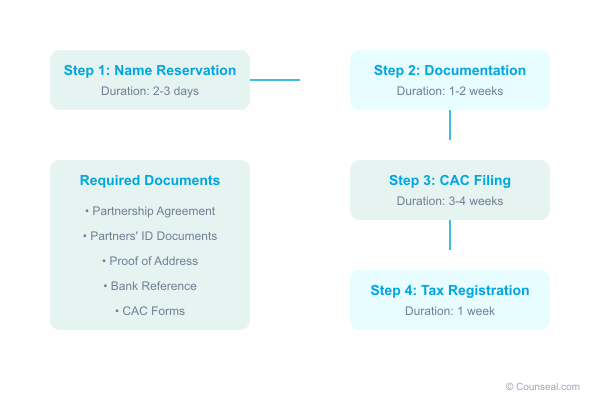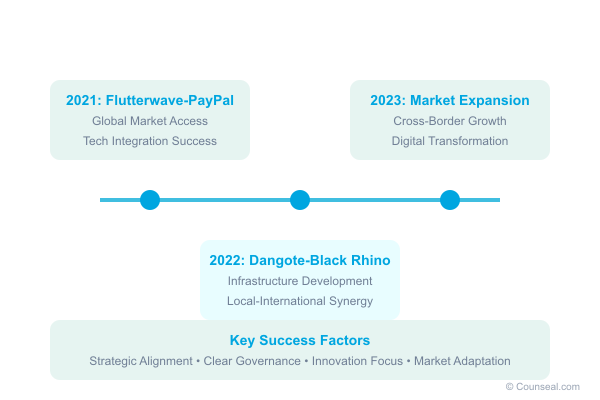Understanding Partnership Agreements in Nigeria: A Comprehensive Guide

by Counseal Team
Updated February 14, 2025

In Nigeria’s dynamic business landscape, partnership agreements serve as the foundation for successful business relationships. Whether you’re starting a new venture or formalizing an existing partnership, understanding these agreements is crucial for long-term success.
In Nigeria’s dynamic business landscape, partnership agreements serve as the foundation for successful business relationships. Whether you’re starting a new venture or formalizing an existing partnership, understanding these agreements is crucial for long-term success.

The Fundamentals of Partnership Agreements
A partnership agreement is a legally binding document that outlines the rights, responsibilities, and obligations of each partner in a business venture. In Nigeria’s complex business environment, where the World Bank ranks the country 131st in ease of doing business, these agreements provide essential structure and protection.
Key Components of Partnership Agreements
- Partner Identification and Roles
- Detailed partner information and contact details
- Clear definition of each partner’s responsibilities
- Decision-making authority and voting rights
- Financial Structure
- Initial capital contributions
- Profit and loss sharing ratios
- Ongoing financial commitments
- Resource allocation
- Operational Framework
- Business management procedures
- Day-to-day operational responsibilities
- Strategic decision-making processes
- Conflict resolution mechanisms
Types of Partnerships in Nigeria
General Partnerships
General partnerships represent the most straightforward form of partnership, where all partners share equal responsibility for the business’s management and liabilities. Under Nigerian law, these partnerships must register with the Corporate Affairs Commission (CAC) and comply with the Partnership Act of 1890.
Limited Partnerships (LP)
Limited partnerships combine active management partners with passive investors. This structure particularly suits businesses seeking capital investment while maintaining operational control. The Companies and Allied Matters Act (CAMA) 2020 governs these partnerships.
Limited Liability Partnerships (LLP)
LLPs offer the best of both worlds: partnership flexibility with corporate liability protection. This structure has gained popularity among professional service firms and tech startups in Nigeria.

Legal Framework and Registration
Regulatory Requirements
- Corporate Affairs Commission (CAC) Registration
- Tax Identification Number (TIN)
- Annual Returns Filing
- Partnership Agreement Documentation
Documentation Process
- Business name reservation
- Partner identification documents
- Partnership agreement
- CAC forms completion
- Payment of prescribed fees
Risk Management and Conflict Resolution
Common Partnership Challenges
- Misaligned business objectives
- Financial disputes
- Operational disagreements
- Management conflicts
Preventive Measures
- Clear communication protocols
- Regular partnership reviews
- Documented decision-making processes
- Professional mediation procedures
Visit counseal.com/start to create your partnership agreement
Case Studies: Successful Nigerian Partnerships
Tech Sector Example
The partnership between Flutterwave and PayPal demonstrates how strategic collaboration can drive market expansion. This alliance enabled African merchants to access PayPal’s global customer base while maintaining local market expertise.
Manufacturing Sector Example
The Dangote Group’s partnership with Black Rhino for power plant development showcases how local expertise combined with international investment can create substantial infrastructure projects.

Practical Implementation Steps
- Initial Planning
- Partner selection criteria
- Business objective alignment
- Resource assessment
- Market analysis
- Agreement Drafting
- Legal consultation
- Document preparation
- Partner review
- Final agreement execution
- Ongoing Management
- Regular partnership meetings
- Performance monitoring
- Agreement updates
- Compliance checks
Conclusion
Partnership agreements in Nigeria require careful consideration of legal requirements, operational needs, and risk management strategies. By following this comprehensive guide and seeking professional legal counsel, entrepreneurs can establish strong foundations for successful business partnerships.




